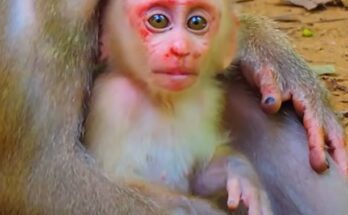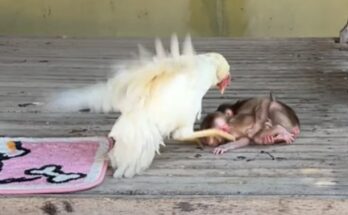Why You Sleep Here?? Baby Monkey, So It’s a Pity
The sight of a baby monkey sleeping in an unusual or uncomfortable place often stirs a mix of emotions—curiosity, concern, and sadness. These small, vulnerable creatures depend heavily on their mothers for safety, nourishment, and warmth. When a baby monkey is found sleeping in a strange or exposed location, it may indicate that something is amiss, making it a truly pitiable scene.
Baby monkeys, like all young animals, require constant care in their early months. In the wild, they typically sleep nestled against their mother’s chest or surrounded by the safety of their troop. Such close physical contact provides not only warmth but also a sense of security, essential for their emotional and physical development. So when a baby monkey is spotted sleeping alone—perhaps on the ground, a branch, or an open area—it often raises questions. Why is the baby here? Is it orphaned, abandoned, or simply lost?
One of the saddest possibilities is that the baby monkey might have been separated from its mother, either due to natural predators, accidents, or even human interference. In some regions, the illegal wildlife trade poses a significant threat to primates. Baby monkeys are sometimes taken from their mothers to be sold as pets or used in performances, leaving them confused and frightened in unfamiliar environments. Such separation can lead to emotional distress and difficulty in survival, as these young monkeys are unprepared to fend for themselves.
Another possibility is that the mother is nearby but temporarily unable to care for her infant. In some cases, a mother might be weak, sick, or injured, leaving her baby vulnerable. Troop dynamics can also play a role; dominant members might harass or separate weaker monkeys and their offspring, leaving the baby exposed.
Seeing a baby monkey sleeping in such a pitiable state serves as a poignant reminder of the challenges faced by wildlife in both natural and human-altered environments. It highlights the importance of protecting these creatures and their habitats. Conservation efforts, including anti-poaching measures and awareness campaigns, are crucial to ensuring that baby monkeys and their families can live safely in the wild.
For those who encounter such situations, it’s essential to act responsibly. Observing from a distance and contacting local wildlife rescue organizations can make a difference. Every effort counts in giving these innocent creatures a chance to thrive.


